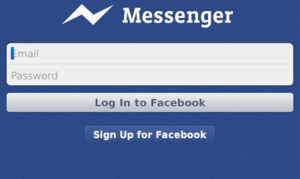Facebook Messenger: Why I Jumped OFF the Freak Out Bandwagon and Downloaded the App
 Facebook Messenger: Join me in Jumping OFF the Freak Out Bandwagon (even if you decide not to download the app)!
Facebook Messenger: Join me in Jumping OFF the Freak Out Bandwagon (even if you decide not to download the app)!
I pride myself in debunking Facebook and internet rumors, but in the case of Facebook Messenger, I really dropped the ball. I jumped on the freak out bandwagon over Facebook’s Messenger app without doing my due diligence. After doing a bit of research I realize that not only was the freak out unnecessary, it was a little silly. My apologies; I’m hanging my head in shame and that’s why I wanted to clear up any confusion caused by my posts.
So let’s start at the beginning…
Facebook has been strongly encouraging Messenger’s download for quite a while. When it became mandatory in order to continue mobile messaging through the platform, several articles were published that pointed to the “insidious” and “creepy” permissions that the app requests. Here’s a link to the Huffington Post article that caused me to jump on the anti-Messenger bandwagon. I admit that when I read those permissions, I freaked! The do sound insidious and very creepy on the surface. Rather than doing my research, I posted the link to the above article across all of my social channels and recommended that clients, friends, and followers NOT download the app.
Then I read a couple of Facebook posts from some app developers and software engineers and realized that, in all likelihood, all of us who were/are freaking out about these Facebook Messenger permissions have probably given other apps similar permissions without giving it a second thought. For instance, do you use other messaging apps on your phone? How about Google search, Shazam, Viggle, or WhatsApp (there are plenty more, but I won’t bore you by listing them all)? For some context, here’s a link to Google’s app permissions explanation. I think you’ll find some incredibly similar permissions listed there, yet there weren’t 700 articles published calling them creepy or insidious.
After the freak out began, Facebook attempted to explain the Messenger permissions. I don’t think Facebook actually went far enough in its explanation because, while they explained what these permissions would allow, it doesn’t explain why they are asking for these permissions up front. For those of us who use apps without truly understanding the workings of them, these permissions can appear sinister in nature, causing (some of) us to believe that Facebook is literally trying to remotely take control of our phones. Eek!!!
In my opinion the problem lies not in the permissions they want, but in the wording of those permissions (of which Facebook has no control). Let’s take a look at the ones that have people the most freaked out (pulled from the Facebook explainer article)…
The permissions listed below are Android permissions for Messenger, but they are very similar to iOS permissions :
- Take pictures and videos: This permission allows you to take photos and videos within the Messenger app to easily send to your friends and other contacts
- Record audio: This permission allows you to send voice messages, make free voice calls, and send videos within Messenger
- Directly call phone numbers: This permission allows you to call a Messenger contact by tapping on the person’s phone number, found in a menu within your message thread with the person
- Receive text messages (SMS): If you add a phone number to your Messenger account, this allows you to confirm your phone number by finding the confirmation code that we send via text message
- Read your contacts: This permission allows you to add your phone contacts as Messenger contacts if you choose to do so. You can always stop syncing your phone contacts by going to your Messenger settings
My Take after Jumping Off the Bandwagon:
In each of these instances, truly the only thing we’re agreeing to is that we won’t have to grant these permissions each time we use the features.
In other words, let’s say you want to share a photo or video with a friend via a Facebook private message while using your phone. If the app hadn’t been granted permission in advance then every time you attempt to share a photo or video you’d see a pop-up asking for permission to access your photos or videos. That would be annoying!
The same goes for recording audio. Do we really believe that Facebook wants to record the private conversations of a billion people? What would be the point? Instead this permission allows us to speak a message (like you can do with texting or other messaging or search apps) rather than type it. If we don’t grant this permission up front then every time you want to speak a message you’ll be asked for permission to access your phone’s microphone.
Directly call phone numbers. This one did sound a little creepy at first glance since it gave the impression that Facebook would randomly (and without our knowledge) call our contacts. Again, let’s ask ourselves what the point would be for Facebook to do this? Yeah, it seems kind of silly to believe that’s what this is about. Instead this refers to a new feature within Messenger that allows us to call the person we’re messaging with from within the app. Without granting the permission up front we’d be asked for that permission every time we try to use the feature.
Receive texts. If you have two-factor authentication set up you’ve already granted this permission. If you choose not to add your phone number to Messenger, this should be a moot point.
Read your contacts. First of all, Facebook already has the ability to access all of our Facebook contacts, don’t they? The good news with this permission is that you don’t have to sync your contacts with Messenger if you don’t want.
The Final Analysis
My final analysis is this: there’s nothing inherently creepy, insidious, or untoward that’s being asked of us by this app. Fact is we’ve most likely (unknowingly) granted these very same permissions to other apps without a second thought. So while I’ve now jumped off the freak out bandwagon, I do wish Facebook wouldn’t have made this a stand-alone app but one that works within the platform. However, I’m not an app developer so I don’t know if that’s even possible. Maybe it has to be a stand-alone in order to work properly…or keep Facebook from crashing (and we all know how people freak out when THAT happens!).
So, if you want to use your phone to send private messages via Facebook, go ahead and download the app. If you believe that Facebook has some sinister plan to randomly call and text your contacts (and say what to them, exactly?), take random photos, or record your secret conversations then by all means don’t download the app. Just be aware that you’ve probably already given other companies (i.e. Google) these same permissions and they’ve likely never called or texted your friends, taken photos of you, or recorded your conversations.
Let’s face it, folks, if we intend to use technology there are certain aspects of our personal information that we’re going to have to share in order to make the technology work efficiently and effectively. The days of total privacy are over and have been over for quite a while.
Will you download the app or do you still believe this is a sinister plot?


